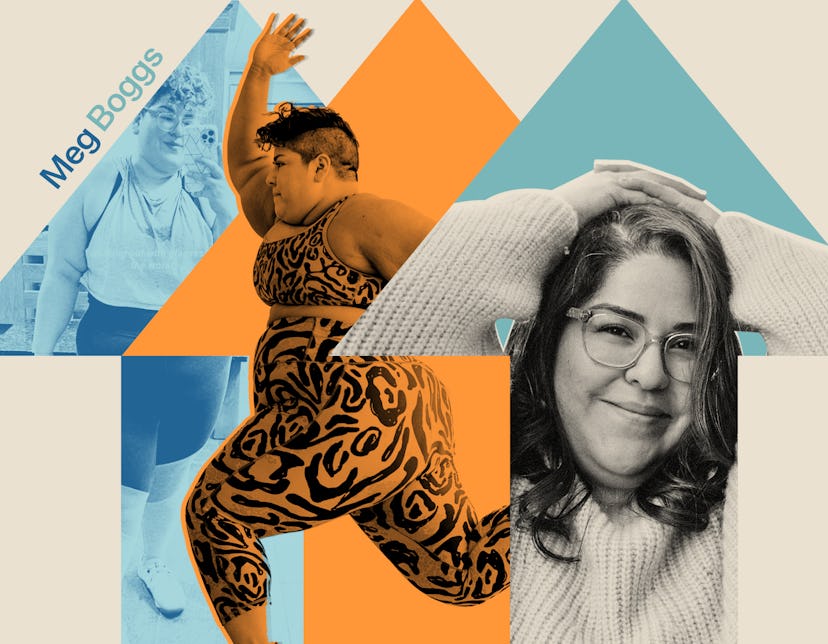The Level Up
Trainer Meg Boggs On Using IG To Bring Body Inclusivity To Fitness
“Representation is the first step to all the other things that could happen.”

In "The Level Up," changemakers in the fitness and wellness industries tell us how they're making an impact in their communities, from pushing for inclusivity to promoting body acceptance and so much more. Here, Meg Boggs talks about the importance of self-love and representation in fitness.
Fitness has always been a part of Meg Boggs’ life. As a childhood track and field athlete, she had dreams of becoming a coach one day. When she wound up pursuing a career in education and teaching music to elementary school students, she felt like something was missing — and pivoted back to athletics in her late twenties. But not without dealing with a slew of hardships.
Boggs experienced compulsive eating and exercising — and a simultaneous mental health spiral — after a doctor suggested she lose weight to have a healthy pregnancy, a recommendation that was based solely on the number on the scale. “I realized pretty quickly that [losing weight] got me a lot of praise,” she tells Bustle. “But whenever my weight stopped going down, the praise went away and I was just left with all of my disordered habits.”
After her daughter Maci was born in 2017, Boggs experienced an a-ha moment: “I was like, I can either teach her all these disordered habits and show her that this is the kind of lifestyle you're going to have to live as a woman, [or] I can do something bigger with my life,” she says.
It was competitive powerlifting that transformed Boggs’ relationship with exercise from an obligation of diet culture to a happiness practice. She took her thoughts to pen and paper, eventually starting a blog in 2017 about her evolving relationship with body image, fitness, motherhood, and more. In the years since, her writings have exploded into a virtual community (she currently has over 407k followers) that explores and celebrates self-love, motherhood, and “fitness for every body” through stories of her personal experiences, workout videos, body affirmations, athletic wear inspo, and more — she even released her first book by the same name in April 2021.
Here, Boggs tells Bustle how she’s pushing for more inclusivity and self-acceptance in the fitness world and beyond.
Tell me about the community you’ve created.
I had like 200 followers [on Instagram when I first started my blog], and then I started sharing about motherhood, postpartum depression, and my mixed feelings surrounding exercise. Women started commenting, “I understand this, I see you, this is what I'm going through right now.” And it just grew from there.
Now it's a big group of women who have shared very similar experiences because we've all been on the diet train and are climbing our way off of it. That's the power of social media: It can have its really toxic sides, but it can also create connections between people who otherwise would feel very alone.
What do you hope to change in the fitness world?
I hope to change the representation. You walk into a gym and all you see are chiseled abs on posters. If you see a body like mine, it's on a transformation photo. You never see somebody like me out there bench pressing and doing push-ups, just killing it and having fun; you see images of a person like me crying as their trainer yells at them. And that's just not the case for a lot of people. Representation is the first step to all the other things that could happen.
How can people make the fitness spaces they occupy more inclusive?
Don't be afraid to use your voice. Our voices are much more powerful than we realize. Ask if there are plus-size trainers or a diverse staff. [Gyms] may not answer you right away, but if more people speak up, they’ll start to think about it.
“I want [people] to feel thankful to live in their bodies.”
If you notice something [you like], point it out as well. Like, “I noticed that you had a plus-size trainer on the floor. That made me feel really seen and represented.” Those little things make a really huge difference.
How can people who feel excluded from fitness spaces build a healthy relationship with exercise?
I've never understood why every fitness program’s first step is to take a “before” photo. Why can't it be about defining what you want to get out of exercise? Think about things that are going to change your life for the better, like more confidence or stamina. For me, I work out about four or five times a week. I feel so much better after, so that's my number one way to take care of my mental health.
If readers of your book, blog, or social media walk away with one message, what do you want that to be?
I want them to feel thankful to live in their body. We’re so resentful of our bodies all the time when they’ve really done quite a lot for us. If someone said “thank you” to their body out loud and felt appreciative for everything it’s done, then I feel like I’ve done my job.
This interview has been edited and condensed for clarity.
This article was originally published on